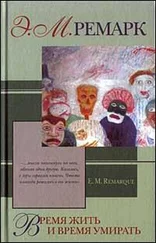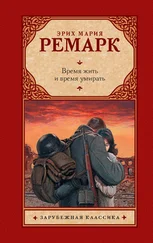| "Where could he have come from?" Graeber asked. He was standing with Fresenburg near the house in which in the Tsar's time the priest had lived. |
- Откуда он взялся? - спросил Г ребер, стоявший вместе с Фрезенбургом около дома, где раньше, жил священник. |
| Fresenburg looked at the shaggy creature that trembled and held its head stretched far out. |
Фрезенбург пристально посмотрел на упрямого пса, который дрожал и вытягивал шею. |
| "From the woods, probably." |
- Наверно, из лесу. |
| "What could he find in the woods? |
- Что ему делать в лесу? |
| There's nothing there for him to eat." |
Там ему кормиться нечем. |
| "There is. Plenty. |
- Нет, почему же. |
| And not just in the woods. |
Корма теперь ему хватит, и не только в лесу. |
| Everywhere." |
Где хочешь. |
| They walked closer. |
Они подошли ближе. |
| The dog turned its head watchfully, ready to flee. |
Пес насторожился, готовый удрать. |
| The two men stood still. |
Гребер и Фрезенбург остановились. |
| The dog was tall and thin with a reddish-gray coat and a long narrow head. |
Собака была большая и тощая, серовато-рыжая, с длинной узкой мордой. |
| ' That's no village cur," Fresenburg said. |
- Это не дворняжка, - сказал Фрезенбург. |
| "That's a good dog." |
- Породистый пес. |
| He made a low clucking sound. |
Он тихо прищелкнул языком. |
| The animal lifted its ears. |
Пес насторожился. |
| Fresenburg clucked again and spoke to him. |
Фрезенбург прищелкнул еще раз и заговорил с ним. |
| "Do you think he's waiting here for food?" Graeber asked. |
- Ты думаешь, он ждет, пока ему кинут что-нибудь? - спросил Гребер. |
| Frensburg shook his head. |
Фрезенбург покачал головой. |
| "There's plenty to eat out there. |
- Корма ему везде хватит. |
| He hasn't come here for that. |
Он пришел не за этим. |
| Here is light and something that resembles a house. |
Здесь свет, и вроде как дом. |
| And here there are human beings. I think he's looking for company." |
По-моему, он ищет общества людей. |
| A stretcher was carried out. |
Вынесли носилки. |
| On it lay someone who had died on the operating table. |
На них лежал человек, умерший во время операции. |
| The dog leaped back a couple of yards. |
Пес отскочил на несколько шагов. |
| He leaped without effort as though propelled by a spring. |
Он прыгнул легко, словно на пружине. |
| Then he stood still and looked at Frensenburg. |
Но остановился и взглянул на Фрезенбурга. |
| The latter spoke to him and took a slow step in his direction. |
Тот снова заговорил с ним и неторопливо шагнул к нему. |
| Instantly the dog sprang back warily but then stopped and, barely perceptibly, wagged his tail a few times. |
Пес опять прыгнул в сторону, потом остановился и едва заметно завилял хвостом. |
| "He's afraid," Graeber said. |
- Боится, - сказал Гребер. |
| "Yes, naturally. |
- Да, конечно. |
| But he's a good dog." |
Но это хороший пес. |
| "And a man-eater." |
- И притом людоед. |
| Fresenburg turned around. |
Фрезенбург обернулся. |
| "We're all that." |
- Все мы людоеды. |
| "Why?" |
- Почему? |
| "We are. |
- Потому что так оно и есть. |
| And we think, just like that dog, that we are still good. |
Мы, как и он, воображаем, что мы хорошие. |
| And just like him we are looking for a bit of warmth and light and friendship." |
И нам, как ему, хочется немножко тепла, и света, и дружбы. |
| Fresenburg smiled with one side of his face. |
Фрезенбург улыбнулся одной стороной лица. |
| The other was almost immobile because of a broad scar. |
Другая была почти неподвижна из-за широкого шрама. |
| It looked as though it wepe dead, and Graeber always found it strange to watch the smile that died at the barrier in his face. |
Она казалась мертвой, и Греберу всегда было не по себе, когда он видел эту улыбку, словно умиравшую у барьера этого шрама. |
| It did not seem to be an accident. |
Казалось, это не случайно. |
| "We're not different from other men. |
- Просто мы люди как люди. |
| It's the war, that's all." |
Сейчас война, этим все сказано. |
| Fresenburg shook his head and with his walking stick tapped the snow from his puttees. |
Фрезенбург покачал головой и стал сбивать тростью снег с обмоток. |
| "No, Ernst. |
- Нет, Эрнст. |
| We have lost our standards. |
Мы утеряли все мерила. |
| For ten years we have been isolated-isolated in a hideous inhuman and ridiculous arrogance that cries to heaven. |
Десять лет нас изолировали, воспитывали в нас отвратительное, вопиющее, бесчеловечное и нелепое высокомерие. |
| We have been proclaimed Herrenvolk whom the others have to serve as slaves." |
Нас объявили нацией господ, которой все остальные должны служить, как рабы. |
| He laughed bitterly. |
- Он с горечью рассмеялся. |
| "Herrenvolk-to obey every charlatan, every command-what has that to do with Herrenvolk? |
- Нация господ! Подчиняться каждому дураку, каждому шарлатану, каждому приказу - разве это означает быть нацией господ? |
| This is the answer here. |
И вот вам ответ. |
| And as usual it hits the innocent harder than the guilty." |
Он, как всегда, сильнее бьет по невинным, чем по виновным. |
| Graeber stared at him. |
Гребер смотрел на него, широко раскрыв глаза. |


![Агата Кристи - На краю [английский и русский параллельные тексты]](/books/32247/agata-kristi-na-krayu-anglijskij-i-russkij-paralle-thumb.webp)
![Сакс Ромер - Ведьмино отродье [английский и русский параллельные тексты]](/books/33237/saks-romer-vedmino-otrode-anglijskij-i-russkij-thumb.webp)
![Агата Кристи - Объявлено убийство [английский и русский параллельные тексты]](/books/33247/agata-kristi-obyavleno-ubijstvo-anglijskij-i-russ-thumb.webp)
![Фрэнсис Фицджеральд - По эту сторону рая [английский и русский параллельные тексты]](/books/34130/frensis-ficdzherald-po-etu-storonu-raya-anglijskij-thumb.webp)
![Мэри Райнхарт - Дверь [английский и русский параллельные тексты]](/books/34133/meri-rajnhart-dver-anglijskij-i-russkij-parallel-thumb.webp)
![Роберт Шекли - Компания «Необузданные таланты» [английский и русский параллельные тексты]](/books/34808/robert-shekli-kompaniya-neobuzdannye-talanty-angl-thumb.webp)

![Эрих Ремарк - Время жить и время умирать [litres]](/books/397303/erih-remark-vremya-zhit-i-vremya-umirat-litres-thumb.webp)